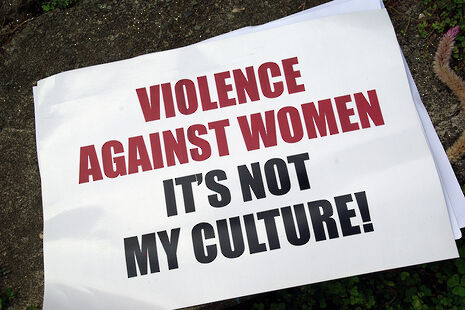Crossing the picket line: the role of men in feminism
Johannes Lenhard asks what role men should have in feminism, and what form it should take

Russell Brand seemed almost keen to talk about his ‘feminine nature’ during his recent appearance at the Cambridge Union, and I was very happy to hear an idol of the masses address gender issues. Considering that in this university only 15% of professors are female, gender equality is indeed a pertinent topic – and not only for women.
Last year, ARU Feminist Society and CUSU Women’s Campaign joined forces to illustrate what feminism meant for students in Cambridge. With their campaign I need feminism because…, they didn’t only make it into the Huffington Post, but also spurred me to finally think these things through.
I was amazed by one aspect of the campaign in particular: photos of men were among those whose messages were lauded the most (at least if we measure appreciation in terms of Facebook likes). "Men are called lads and women sluts for the same behaviour"; "The sentence I am all for women’s rights needs to end with a full stop not with a but". Many men are aware of the inequality around them, and are conscious of how their behaviour is judged by different standards. Most importantly, however, these pictures and their authors illustrate that there is role for men in feminism.
For me, there is no way to dispute the premises of feminism. I can wholeheartedly assert that there indeed is male dominance in many parts of society. This is true in Cambridge as much as anywhere else: open your eyes and look at a staff list of a random Cambridge department.
So what is feminism? And what can be my role in it? Even for many women, it is hard to know exactly what feminism means. Some, like singer-turned-first-lady Carla Bruni, don’t like the word. Others, like Madonna – Miley Cyrus of the 1980s – prefer to call themselves humanists. All of this paints a messy picture. At the heart of the movement seems to be ‘equality’. The term ‘male feminist’ conjures up undesirable images of men who claim to be a put-upon minority. As usual, alternatives are not as good: pro-feminist and equalist are just not catchy. For now, I'm happy to be a feminist.
At the heart of my issue, however, is how men can help. Many claim that men will never experience the same inequalities as women. But they can still make a difference for women, can't they? There are (seemingly) easy, everyday things that men can do to get a little closer to equality. Mock your own masculinity – it's no problem if you like tight jeans, lace tops and platform shoes – tell other men off when they next make arsehole comments about the ‘fit slut’ on the next table, and talk to them about how wonderfully counterproductive porn is when it comes to achieving equality.
But I would go beyond that. Men do not only have a role in feminism and in the quest for equality: they are crucial, and this is where the water between some feminists and me might get deep. Men are in many ways responsible for the continued suppression of women and it’s exactly the men in positions of power – music producers, CEOs, senior politicians, university professors – that need to become feminist, equalists or at least ‘pro-women’. If the metaphorical ocean, i.e. the picket line of men in suits guarding their own posts, doesn’t divinely part for women to walk through, we will have to wait for the mass mortality of the people currently ruling the ‘old, white men clubs’.
To return to Russell Brand again: can it not be a first step for every man out there to notice this privilege, and recognise his position on the picket line? At least Brand knows and talks about his own failures and early-life sexism. But talk is not enough, especially if you, as Brand did at the Union, forget that ‘poofs’ are also part of the march towards equality. A movement striving for equality is for everyone, and should be supported by everyone.
 News / SU reluctantly registers controversial women’s soc18 December 2025
News / SU reluctantly registers controversial women’s soc18 December 2025 News / CUP announces funding scheme for under-represented academics19 December 2025
News / CUP announces funding scheme for under-represented academics19 December 2025 Features / Should I stay or should I go? Cambridge students and alumni reflect on how their memories stay with them15 December 2025
Features / Should I stay or should I go? Cambridge students and alumni reflect on how their memories stay with them15 December 2025 Fashion / The art of the formal outfit 18 December 2025
Fashion / The art of the formal outfit 18 December 2025 News / Dons warn PM about Vet School closure16 December 2025
News / Dons warn PM about Vet School closure16 December 2025









